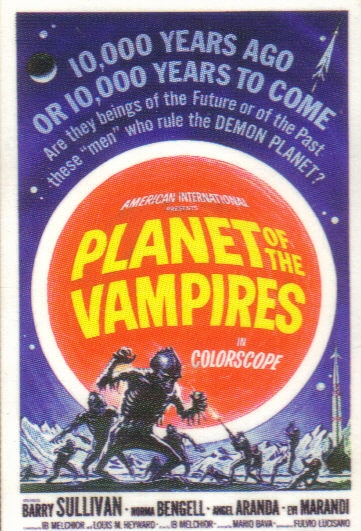 For the most part this 1965 Italian horror/sci fi chiller is every bit as goofy as you might expect, yet worthy nonetheless for the stunning visuals, courtesy of the late, great Mario Bava.
For the most part this 1965 Italian horror/sci fi chiller is every bit as goofy as you might expect, yet worthy nonetheless for the stunning visuals, courtesy of the late, great Mario Bava.
PLANET OF THE VAMPIRES/TERRORE NELLO SPAZIO, once known by over a dozen separate titles (DEMON PLANET, THE HAUNTED WORLD, PLANET OF THE BLOOD, SPACE MUTANTS, etc.), was one of several potboilers directed by Mario Bava in the mid-sixties (see also KNIVES OF THE AVENGER, ALAMO BILL and DR. GOLDFOOT AND THE GIRL BOMBS), offsetting more personal and artistic efforts like BLACK SABBATH and THE WHIP AND THE BODY. It was partially written by Ib Melchior, who for a time in the sixties specialized in scripting English dialogue for foreign language monster movies (including REPTIILICUS and JOURNEY TO THE SEVENTH PLANET, both emerging from Denmark).
PLANET OF THE VAMPIRES was released in the US by American International Pictures, who did their usual cut-and-paste job on it, complete with the requisite crappy English dubbing. The film, furthermore, is often cited as a direct influence on ALIEN (along with IT! THE TERROR FROM BEYOND SPACE), and there are definite similarities.
A band of cosmonauts intercept a distress call from a distant planet. Approaching the mysterious globe they find it covered in fog, and upon touching their rocket down on the surface are overcome with a strange lassitude. Many of the crewmembers begin behaving strangely with no memory of their behavior afterward. Worse, they find their rocket’s battery power inexplicably drained.
But the horror really begins when the bloody corpse of one of the ship’s crewmembers is discovered. From there it’s a nonstop cat-and-mouse pursuit through the rocket and the strangely beautiful multi-colored planet. It seems a previous band of cosmonauts crashed on the planet prior to the protagonists, and the members of that earlier crew were turned into vampires who still lurk, hungering for human blood!
Yet there’s another, even deadlier force afoot. It affects the cosmonauts’ minds as they sleep, and causes them to do untoward things. A guard is posted to keep the crew awake, but it’s not enough, as crewmembers continue to be picked off by the unseen vampires—and then brought back to life!
The undead infestation gets so bad that before long only the rocket’s captain and a lady crewmember are left non-vampirized, and are forced to deal with the undead horde on their own.
Much about this film is campy and downright laughable nowadays (the ultra-primitive special effects no longer seem all that special), and the camp factor isn’t helped by the repetitive non-story and stilted English dubbed performances.
Yet Mario Bava’s artful and atmospheric visuals are beyond reproach. Bava as usual acted as his own (partial) cinematographer, and creates an eerily beautiful landscape of mist and darkness. This is without question the most overtly gothic science fiction picture of all time, and there are moments of shivery horror worthy of Bava classics like BLACK SUNDAY and BLOOD AND BLACK LACE. There’s also some fairly intense (for the time, anyway) gore.
Another Bava trademark is the low budget ingenuity. The Schufftan Process (named for cinematographer Eugen Schufftan), popularized on films like METROPOLIS and THE 39 STEPS, is utilized here to interesting effect; it involves placing a mirror before the camera with select portions of the reflective surface rubbed out, thus allowing actors to interact with miniature scenery. Beyond that, Bava creates wonders with smoke effects and single-source lighting, proving yet again that nobody could do more with a limited budget than Mario Bava.
Vital Statistics
PLANET OF THE VAMPIRES (TERRORE NELLO SPAZIO; DEMONPLANET; TERROR IN SPACE, et al)
American International Pictures
Director: Mario Bava
Producer: Fulvio Lucisano
Screenplay: Ib Melchior, Luois M. Heyward
Cinematography: Antonio Rinaldi (and Mario Bava)
Editing: Romana Fortini, Antonio Gimeno
Cast: Barry Sullivan, Norma Bengell, Angel Aranda, Evi Marandi, Stelio Candelli, Franco Andrei, Fernando Villena, Mario Morales, Ivan Rassimov, Rico Boido
